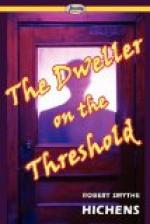“I approached the matter craftily. I dwelt first upon the great spread of infidelity in our days, and the necessity of combating it by every legitimate means. I spoke of the efforts being made by earnest men of science—such men as Professor Stepton, for instance—to get at the truth Christians are expected to take on trust, as it were. I said I respected such men. Chichester agreed,—when did he not agree with me at that time?—but remarked that he could not help pitying them for ignoring revelation and striving to obtain by difficult means what all Christians already possessed by a glorious and final deed of gift.
“I saw that though Chichester was such a devoted worshiper of mine, if I wanted to persuade him to my secret purpose,—no other than the effort, to be made with him, to communicate with the spirit world,—I must be deceptive, I must mask my purpose with another.
“I did so. I turned his attention to the subject of the human will. Now, at that time Chichester knew that his will was weak. He considered that fact one of his serious faults. I hinted that I agreed with him. I proposed to join with him in striving to strengthen it. He envied my strength of will. He looked up to me, worshiped me almost, because of it. I drew his mind to the close consideration of influence. I gave him two or three curious works that I possessed on this subject. In one of them, a pamphlet written by a Hindu who had been partly educated at Oxford, and whom I had personally known when I was an undergraduate, there was a course of will-exercises, much as in certain books on body-building there are courses of physical exercises. I related to Chichester some of the extraordinary and deeply interesting conversations I had had with this Hindu on the subject of the education of the will, and finally I told a lie. I told Chichester that I had gained my powerful will while at Oxford by drawing it from my Hindu friend in a series of sittings that we two had secretly undertaken together. This was false, because I had been born with a strong, even a tyrannical, will, and I had never sat with the Hindu.
“Chichester, though at first startled, was fascinated by this untruth, and, to cut the matter short, I persuaded him to begin with me a series of secret sittings, in which I proposed to try to impart to him, to infuse into him, as it were, some of my undoubted power—the power which he daily saw me exercising in the pulpit and over the minds of men in my intercourse with them.




